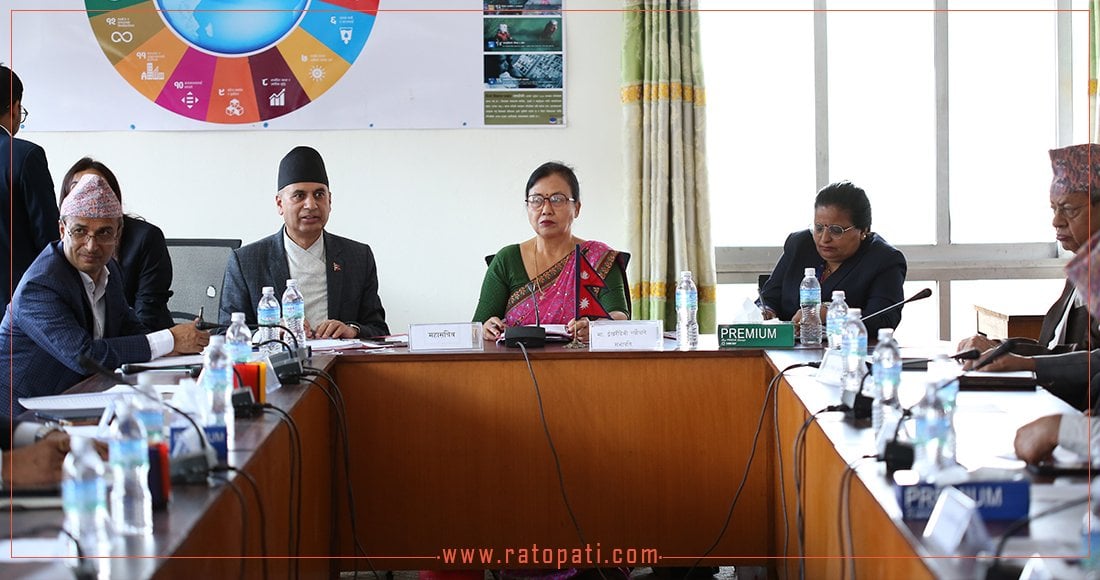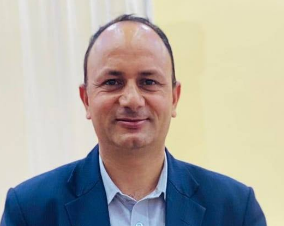Ethical questions arise in recent ambassador recommendations

Kathmandu, September 22 — The recent decision to approve the names of controversial individuals recommended by the government for ambassadorial appointment has raised serious questions about the legitimacy of the parliamentary hearing committee.
Following the endorsement of 16 names, including four disputed ones, the committee has come to be seen as a mere "rubber stamp" for the government.
Of the 17 names recommended, 12 received unanimous approval, while four were approved by majority vote. However, the graduation certificate of Ramakrishna Bhattarai, proposed for Sri Lanka, was not located, leading to a postponement for a future decision.
DP Aryal, an MP from the Rashtriya Swatantra Party, raised objections for three candidates, and Prakash Adhikari from the Janata Samajwadi Party objected to four, but their dissent did not change the outcome.
The MPs from the Rashtriya Swatantra Party had differing opinions on the nominations of Kapilman Shrestha for South Africa, Netra Prasad Timalsina for Malaysia, and Dhan Prasad Pandit for Israel, while the Janata Samajwadi Party also voiced concerns regarding Shankar Sharma’s nomination for India.
The committee recently granted unanimous approval for several other ambassadorial appointments, including Shivamaya Tumbahangfe in South Korea, Janga Bahadur Chauhan in Russia, Prakashmani Paudel in Portugal, Rita Dhital in Pakistan, Dr. Shail Rupakheti in Germany, Sumnima Tuladhar in Denmark, Prof. Krishna Prasad Oli in China, Naresh Bikram Dhakal in Saudi Arabia, Ramesh Chandra Paudel in Qatar, Salin Nepal in Spain, Chandrakumar Ghimire in the UK, and Lokdarshan Regmi in the US.
Who are the controversial figures and why?
Kapilman Shrestha
Shrestha is a former member of the National Human Rights Commission. The Constitution prohibits the appointment of commission members to other government positions.
According to Article 248 (8) of the Constitution, the question of his eligibility for ambassadorial appointment was raised in the committee. The article states: "A person who has served as the chairman or a member of the National Human Rights Commission shall not be eligible for appointment to other government services." However, it also notes that this does not prevent such individuals from being appointed to political positions or from engaging in research or investigation roles.
Despite questions surrounding his nomination, the majority of committee members ultimately supported Shrestha, leading to his approval.
Dhan Prasad Pandit
Dhan Prasad Pandit, who was convicted by the court for violating Article 27 of the Constitution by concealing information while serving as the head of the Padmakanya Multiple Campus under Tribhuvan University, was approved by the committee by majority vote.
The National Information Commission had imposed a fine of 15,000 for failing to provide information as required by Article 27 during his tenure at the campus, a decision that was upheld by the Patan High Court.
Despite questions raised in the parliamentary committee regarding his constitutional violations, his name was still approved by the majority. MP Aryal noted in his dissenting opinion, "A person convicted of concealing information and fined 15,000 by the court is not eligible to be an ambassador under any circumstances."
Netra Prasad Timalsina
Another nominee, Netra Prasad Timalsina, had a long tenure with the Nepal Red Cross Society. He was involved in a lawsuit against the government and faced allegations of document forgery related to an international service organization. Committee members raised significant concerns regarding this matter. However, the main opposition party, CPN-Maoist Center, aligned with the ruling coalition in supporting his nomination. Aryal and Adhikari expressed differing opinions on Timalsina's candidacy.
The dissenting opinion stated, "It is certainly inappropriate for someone who has filed a case against the Nepal government to represent the government in a foreign mission while the case is still pending. This complaint cannot be overlooked, and it does not reflect high moral conduct under any circumstances."
Shankar Sharma
Dr. Shankar Sharma has been recommended for the position of ambassador to India for the second time, and his name was approved by a majority of the parliamentary hearing committee. This situation arises from allegations that he was recommended contrary to the Guidelines for Ambassador Appointment, 2018, which were previously approved unanimously. Sharma served as Nepal’s ambassador to India starting in March 2022, but the government recalled him on June 6 this year before his term ended.
Following the formation of a new ruling coalition, he was once again nominated for the same position. This contradicted a provision in point 21 of the Guidelines for Ambassador Appointment, 2018, which states that "no re-appointment will be made in the country where the ambassador is currently working for another term."
Based on this provision, MP Adhikari expressed a dissenting opinion and argued against approving Sharma's nomination. However, his concerns were overshadowed by the majority's vote.
What does the Constitution say?
Article 282 of the Constitution of Nepal outlines the recommendations for ambassadors. It states that "the President may appoint Nepali ambassadors and special representatives for specific purposes based on the principle of inclusiveness."
Similarly, Article 283 emphasizes that appointments must adhere to this principle. It specifies that "appointments to the posts of constitutional organs and bodies shall be made in accordance with the principle of inclusiveness." Both articles indicate that the recommendation of ambassadors should follow this inclusive principle.
Once a recommendation is made, it goes to the next stage where Parliament is responsible for reviewing these recommendations. To facilitate this process, a hearing committee, consisting of members from both houses of the federal parliament, is established.
Article 292 provides for parliamentary hearings. Sub-section 1 states that "prior to the appointment of the Chief Justice, Supreme Court judges, Judicial Council members, heads or officers of constitutional bodies, and ambassadors, there shall be a parliamentary hearing in accordance with federal law."
Sub-section 2 mandates that "a joint committee of fifteen members will be formed according to federal law, consisting of members from both houses of the federal parliament."
The Constitution thus stipulates that individuals approved through recommendations and parliamentary hearings should possess high moral character and be free from controversy. The Supreme Court has also ruled that high moral character is essential for appointments.
In light of the repeated recommendations and appointments of controversial figures, the Supreme Court has called for clear standards regarding ambassadors. Following this ruling, the government formulated the Guidelines for Ambassador Appointment, 2018, which were published and implemented. However, despite these standards, the government recommended and the parliamentary hearing committee approved controversial nominations, disregarding extensive discussions and complaints.
Why are controversial names approved time and again?
Parliamentary hearings were introduced in Nepal with the interim constitution of 2007 and continued under the 2015 constitution. However, during KP Sharma Oli's tenure as Prime Minister in 2017, he dissolved parliament and appointed 52 individuals to constitutional posts without conducting parliamentary hearings.
Notably, Samim Miya Ansari was appointed as the chairman of the Muslim Commission 45 days after the committee's recommendation, despite his controversial background. Similarly, Lokman Singh Karki was appointed as the chief commissioner of the Commission for Investigation of Abuse of Authority without a hearing.
To date, only two government-recommended candidates have been rejected by the committee. Krishnaman Pradhan was denied as a member of the Election Commission on July 30, 2024, due to ethical concerns, but he later withdrew from the hearing process.
Earlier, Deepak Raj Joshi's nomination as Chief Justice of the Supreme Court was rejected on August 3, 2018, for multiple reasons, including doubts about his educational qualifications and a controversial reputation.
The constitution mandates that the parliamentary committee connect appointments to constitutional posts with public accountability. However, Ishwar Khatiwada, a former Supreme Court judge, believes the committee has failed to meet its intended goals, weakening its rationale.
Gopalkrishna Ghimire, president of the Nepal Bar Association, argues that the hearing committee lacks justification. He suggests that the process should be abolished, as it has repeatedly failed to confirm its purpose. He noted, "The court has become more controversial, and judges seem to be merely facilitating political agendas."
Ghimire advocates for public hearings, especially for judges, which could be conducted by the judicial council or other relevant bodies. Senior advocate Tikaram Bhattarai remarked that parliamentary hearings have devolved into contentious debates, undermining judicial independence. He questioned the appropriateness of judges seeking political support to secure favorable decisions during these hearings.
Chandrakant Gyawali, another senior advocate, expressed concern that the committee is ineffective. He emphasized that appointing controversial figures undermines the goal of selecting individuals of high moral character. Gyawali stated, "If someone has a controversial background or has committed wrongful acts, the committee should have the courage to reject them. Otherwise, its rationale is compromised."
The Supreme Court has also weighed in on parliamentary hearings. In a petition filed by Subidhman Napit in 2011, the court affirmed the necessity of these hearings, stating that they serve to assess competency. The court indicated that the effectiveness of the hearings must be ensured, as stipulated in the constitution.
Experts suggest that the provision of automatic appointment if hearings are not conducted within 45 days should be scrapped.










Leave Comment